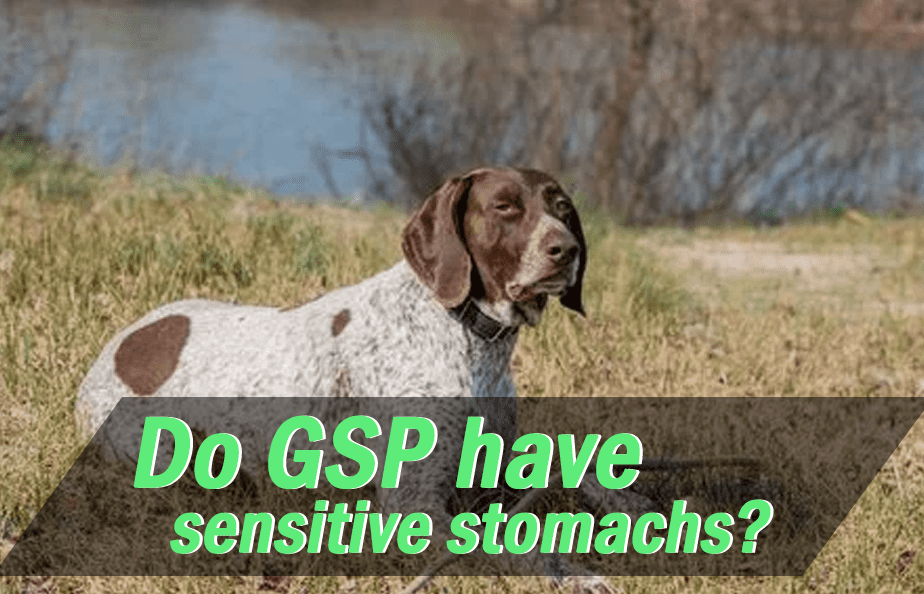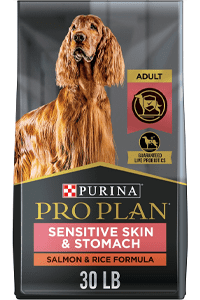German shorthaired pointer or GSP is a highly energetic and powerful sporting dog that is great in hunting and swimming. They have been serving as hunters for a long time and are one of the most loyal dog breeds. German shorthaired pointers can also be friendly and affectionate.
Because of their narrow chest, German shorthaired pointers tend to have very sensitive stomachs. This dog breed might have some of the best hunting and swimming skills, but they don’t have the best digestion. This digestive problem results in many gastric discomforts, bloating, vomiting, etc.
Therefore, it is essential to take good care of a dog’s diet, especially a German shorthaired pointer.

Are German shorthaired pointers gassy?
Yes, German shorthaired pointers tend to get highly gassy or, in other words, bloated. GSPs have narrower chests with sensitive stomachs, making them bloat after eating certain foods.
When they bloat, gas fills their stomach, making them uneasy and restless. When there is bloating in a German shorthaired pointer, the stomach eventually twists, leading to little or no blood supply to the stomach.
When your dog acts restless, uneasy and lies in a prayer position, this is a red sign that your dog needs to see a vet immediately! If you do nothing about it, your dog’s condition could become fatal!
Why do German shorthaired pointers vomit?
German shorthaired pointers have extremely sensitive stomachs; therefore, it is common to vomit repeatedly. There are so many reasons why German shorthaired pointer vomits.
- Your dog must have eaten something indigestible.
- Eating grass too can make dogs vomit.
- Acid reflux can also cause your dog to vomit, which is one common reason for vomiting.
- Your dog might be eating his food too fast.
- Your dog might have a gastric torsion.
- Your dog might have some serious medical condition.
If the vomiting continues for 2-3 days, consult a vet immediately!
Purina Pro Plan Adult Sensitive Skin & Stomach Salmon & Rice Formula Dry Dog Food
- Excellent for your GSP with a sensitive stomach.
- Includes omega-6 fatty acids to help support a healthy skin and coat.
- Check it out below.
What are the signs of bloat in a dog?
Bloating in dogs, also known as Gastric Dilation-Volvulus, is a severe condition that can be life-threatening if not treated at the right time. When there is extreme bloating, gas fills up the entire stomach making the stomach twist and the blood flow or supply cut off.
If a dog is not given the proper treatment during such a condition, it can even lead to its death. These are the signs of bloating in a dog:
- Your dog will feel uneasy and restless.
- There will be a visible sign of a swollen abdomen.
- Your dog will lie down in a praying position.
- He will try to vomit then and again.
- Signs of loss of energy.
- Drooling.
- Your dog will look distressed and unhappy.
These are signs that a dog requires treatment. Do not wait longer than 2-3 days.
What is gastric torsion in a dog?
Gastric torsion is also known as Gastric Dilation Volvulus (GDV) syndrome. It is a condition or disorder in which gas or liquid fills up the entire stomach. When this happens, the stomach gets twisted, blocking the pathway of blood supply.
This usually happens in narrow or deep-chest dog breeds like German shorthaired pointers. When a dog has gastric torsion, it will show signs of restlessness, distress, vomiting, drooling, swollen abdomen, pain in the gut, loss of appetite, etc.
Once your dog starts showing any of these signs, take him to a vet immediately. Gastric torsion in dogs is not a matter to be taken lightly.
How to stop GSPs from bloating?
German shorthaired pointer’s bloating or any dog breed’s bloating should not be lightly taken. When it gets extreme, this bloating will fill the entire stomach with gas making the stomach twist, which ultimately puts pressure on other organs. This pressure makes breathing difficult for the dog, and even the blood flow gets disrupted.
It is advised to consult a doctor in such cases. However, one can do these things to stop or reduce the bloating during emergencies:
- Give your adult dog small amounts of meals after every few hours instead of two heavy meals.
- Never give human food such as chocolate, garlic, etc., to your dog.
- Don’t let your dog drink too much water.
- Use a bowl that will slow down your dog’s eating.
How much water should a GSP puppy drink?
Did you know German shorthaired pointer puppies need to drink more water than an adult GSP? These puppies needed to hydrate to grow healthy and robust properly.
To be approximate, a GSP puppy needs to drink at least 1 to 8 cups of water per pound of each pup’s different body weights. Make sure you feed clean drinkable water to your dog.
Of course, newborn puppies will drink from their mother’s milk to fulfil their thirst. However, once they start having solid food, make sure they are adequately hydrated.
Puppies tend to play almost the whole day, so make sure water is readily available for your puppy to come and drink it. Remember, canine dehydration is a matter of concern which can become fatal if not given proper care.
What foods are GSP allergic to?
German shorthaired pointers have extremely sensitive stomachs, so one cannot feed anything or everything to these furry friends. They are susceptible to many food items such as wheat, egg, beef, dairy products, chicken, lamb, corn, soy, pork, fish, etc.
Your dog will show signs of itching, vomiting, diarrhea, infections on specific body parts, etc. In such cases, take your dog to the vet in the first hour. And now that you know what foods they are allergic to avoid feeding them those foods altogether.
Can we feed homemade food to GSPs?
The answer to this question is a hand-down Yes. German shorthaired pointers have a sensitive stomach or digestive system, making them vulnerable to quickly falling sick. Therefore, strict and proper care must be given to the dog’s diet.
Of course, one can always give dog feed to your German shorthaired pointer. However, sometimes we tend to be careless and unfortunately, the dog ends up eating a food item they are allergic to, which is how your dog ends up in trouble.
Homemade food is one good way to take proper care of your dog’s diet. You are aware of what your dog is allergic to, so you take appropriate notes while preparing the food. Also, giving homemade food to your dog is much fresher and healthier.
Do German shorthaired pointers tend to overeat?
German shorthaired pointers are heavy dogs that have hefty appetites. They are hunter dogs that are very energetic and powerful. Therefore they tend to overeat. Of course, they need unique and nutritious food. However, they again have very sensitive stomachs, which makes them fall sick easily when taken too much or improper nutrition.
As a German shorthaired pointer owner or breeder, one must keep in mind their stomach sensitivity and feed them accordingly.
What kind of dog food is best for German shorthaired pointers?
German shorthaired pointers have sensitive stomachs; therefore, double care should be given to their diet. Apart from the food they are allergic to, mentioned above, the best food for a German shorthaired pointer is homemade food.
Yes, homemade food is fresh and organic, and there are very few or no chances for their digestion to go bad if proper care is given while preparing. You can also give your dog treats from time to time since all dogs go crazy for them. Before buying, make sure the treat is stomach-friendly to your dog breed.
You can also feed them carrots, green beans and other green veggies to strengthen their digestive system and extra fiber.
How much should you feed a German shorthaired pointer?
German shorthaired pointers might have big appetites, but that doesn’t mean you can feed them heavy meals. Being a GSP owner or breeder, you must know that they have a sensitive stomach. So, feed them so your dog will not stay hungry and their stomach will be at peace.
An average German shorthaired pointer must be fed 2-3 bowls or cups of their food. However, divide those cups and feed them ½cups every two to three hours while feeding them. That way, they won’t starve as well as it will be better for their stomach.
Are GSPs picky eaters?
No. German shorthaired pointers are not picky or fussy eaters when it comes to food. This dog has a large appetite, and they tend to eat almost everything they are fed.
However, that doesn’t mean you can feed them everything. German shorthaired pointers don’t have picky taste buds, but instead, they have a picky digestive system!
Conclusion
German shorthaired pointers might not have the strongest stomachs or digestive systems. However, that doesn’t stop them from being so incredibly intelligent, energetic, powerful, and sociable dogs.
Now that you have good information about GSPs, take extra care of their diet if you have one at home!


